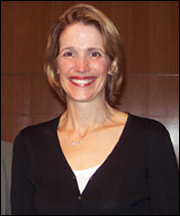
The withdrawal of more than 3 million Teamsters and service employees from the AFL-CIO – along with some $20 million in dues – will not fundamentally change labor economics, according to Teresa Ghilarducci, professor of economics and policy studies at the University of Notre Dame.
“The split in the AFL-CIO has not rewritten the laws of labor economics,” says Ghilarducci, who also directs Notre Dame’s Higgins Labor Research Center. “Workers will still join unions and those unions will still act as a collective voice at work and in politics.”
Though AFL-CIO leaders recently passed a resolution to increase union organizing and political action, labor officials still fear other unions will follow the lead of the Teamsters and service employees. Even so, according to Ghilarducci, the basic role and function of unions will remain unchanged.
“The unions, no matter what their hierarchical structure, will still have to cooperate with each other.”
Historically, several major unions have split, only to subsequently reunify.
“This has happened in the 1930s when the mine workers left the federation – then came back. The Teamsters were kicked out in the 1950s and they came back, and autoworkers left in the 1970s and they came back. This won’t be permanent,” Ghilarducci says.
Contact: Teresa Ghilarducci is available for interviews at 574 631-7581 or ghilarducci.1@nd.edu .
Originally published by at newsinfo.nd.edu on July 27, 2005.